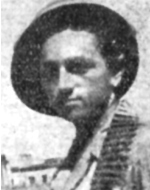Pasternak, Shlomo (Leibush)
Shlomo, the eldest son of Rivka and Eliezer, was born on October 10, 1929 in Romania, in the city of Kachania, in the district of Marmorish, Transylvania, to an elementary school in his hometown. On the eve of World War II, about ten thousand lived in the capital of Marmorish-Sighet, others lived in small towns, among them well-known rabbis, scholars, writers, artisans, and hardworking people. The majority of the Jewish population was deported to Auschwitz and murdered there After the war, he moved to Germany with a strong desire to immigrate to Eretz Israel, where he prepared himself as a mechanic, and he prepared himself to immigrate to Israel with a group of friends, each of whom was a craftsman , And to establish a cooperative of craftsmen On October 14, 1947 he arrived in Eretz Israel and stayed with his relatives for some time as a baker, and when he received a call to enlist, he was afraid that he would fall in battle and no one would say Kaddish in memory of his parents. To defend the country. He served in a religious company in the 33rd Battalion of the Alexandroni Brigade, the 3rd Brigade in the Haganah. Fought in the vicinity of the Triangle and the Negev, took part in many activities and showed great devotion to his comrades and commanders. In December 1948, he fought in Iraq during Operation Horev. Iraq Al-Manshiya was an Arab village at the foot of Tel Qaddum (now Tel Irani near Kiryat Gat), which became an Egyptian military compound. The compound was attacked in October 1948, during Operation Yoav, but the Israeli attack failed and the Egyptians fortified the area even more as part of the “Faluja pocket” where their forces were besieged by Israel. In Operation Horev, it was decided to attack the area again as part of the attack aimed at removing the Egyptian army from the Negev. On December 28, 1948, Alexandroni forces broke into Iraq from al-Manshiyya to the south and took control of it, but their assault on the hill north of the village was repulsed. Meanwhile, the Egyptians recovered, launched a counterattack, and forced our forces to retreat. During the retreat some of the force was captured inside the village. 87 of the Alexandroni fighters fell in this battle, and Shlomo among them. Shlomo was nineteen when he fell. He was buried in Faluja, and a year later he was laid to rest in the military cemetery in Nahalat Yitzhak. Shlomo’s aunt said that on the eve of his departure for the last battle he was not feeling well, but objected to her proposal to invite a doctor and said: “I will not give up on such an opportunity.” Despite the failure in Iraq Al-Manshiya, the forces succeeded in penetrating Sinai. A week later, in early January 1949, a cease-fire was achieved and the fighting on the southern front ceased. This hero is a “last scion”.
